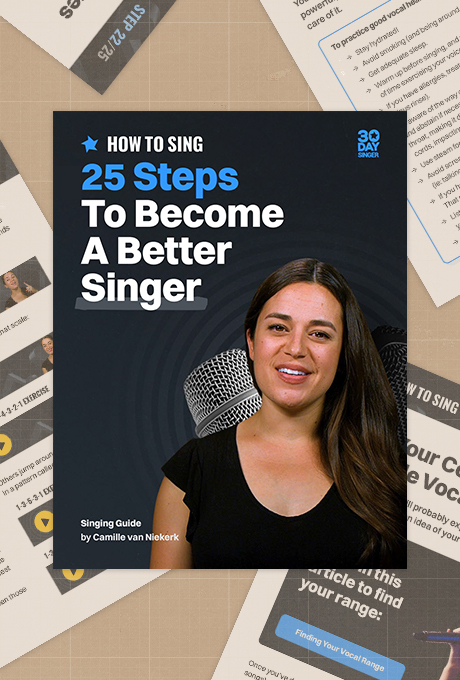What is a ‘Performer Mindset’?
September 7, 2022
From our friends at Voices.com
What is a ‘Performer Mindset’?
Voice acting, much like singing, is a performance.
Much has been, and can still be, said about the comparisons between both performing arts; many singers have become voice actors, and many voice actors move on to try their hand at singing.
For many voice over talent, singing and music was their first love. Performing in front of an audience gave them the first rush that they kept pursuing and refining.
In today’s piece we dive into such an important topic that bridges between both voice acting and singing. In this article we will answer the common question many talent ask their coaches: What is a ‘Performer Mindset’ and how do I train to enter into that space?
We will be gleaning insights from one of the wisest women on this topic, voice over coach Kim Handysides, who’s based out of Montreal, Canada.
Kim’s work has primarily been in commercials, eLearning, and narration with brief forays into gaming and animation and a few on-camera pieces. With a background in theater and film and a thorough grounding in radio and television, her talent, creativity, and relentless work ethic have gained her a stellar reputation.
Here are Kim’s top 8 tips on how to get into a ‘Performer Mindset’:
1. You’re An Athlete!
“Voice actors, artists and anyone in the creative arts really have a lot in common with athletes,” she Kim explains.
“There are different levels of athletes and performers. You've got amateurs, gifted amateurs, semi pro, pro and elite. And in my long, successful career, I've seen amazing things happen in myself and others when performers make a mental shift and reform their mindset to better align with their goals, like athletes.”
2. See Yourself In The Role
“Earlier in my career, when I was about to be hired as a DJ,a weather woman, in movies and in theater roles, I would actually stare at myself in the mirror and talk myself into the belief that I already was an amazing DJ and an accomplished weather woman or a critically acclaimed theater actress, et cetera,” Kim said.
“So you have to see yourself in the role of voice actor before you get there. So visualization actually primes your mind for accepting your new reality as a voiceover actor. It will help you shift into that role more fully.”
3. Understanding Yourself and Your Voice
“You'll begin to zero in on the aural magic all around you. Your voice, other people's voices, how we communicate with each other, on radio, TV, pre roll, socials, overheard, in stores, on apps, on the phone, everywhere and beyond this, you'll envision yourself and your contribution to the voice world,” she said.
“This will build your confidence, make you curious and guide your activity to improve and to risk.
She says understanding yourself is truly important although it sounds like it’s too obvious.
“In coaching hundreds of people over the past few years, I've come across very many talented individuals whose biggest stumbling block was themselves. Maybe it was lack of commitment or not respecting the work, like thinking: ‘Oh, it's so easy. Anyone can do it”. No, it's not easy. Not everyone can do it, but a lot of people can with the right attitude.”
4. Take on Your Fears
“Another thing that can hold people back is fear. I've coached a few people who just went from coach to coach to coach, building skills to the point where they were actually competitive but never diving in. Maybe because they wanted to hold on to the dream of becoming a voiceover actor instead of actually facing the possibility that they tried and failed and forgetting that failure only happens if you stop short before achieving your goals,” Kim explains.
“You can prevent that from happening. By owning your voiceover career and knowing that you get out of it what you put into it. No excuses, no blame, just accepting and taking responsibility for your voiceover career.
She says this will help you realize that your career is in your hands now.
“Getting the jobs is not necessarily in your control, but how you approach your career is in your control. And it comes down to time invested,” she said.
5. Own Auditioning
“When I asked students, how many auditions are you doing every week, so many say five or maybe even just three times, and that is not going to get you anywhere. I mean, can you imagine a professional athlete saying: “I only go to the gym for 90 minutes a week”? No, it's a nine to five job,” Kim suggests.
“When my kid, who's now a voiceover actor herself in her late 20s, when she was a competitive swimmer as an adolescent. That meant 12 hours in the pool, minimum each week, on top of school and everything else. That's what it took for her to be competitive at a provincial level.”
Kim said owning auditioning means understanding the flexibility of being an artist in control of your own schedule.
“The cool thing is, you’re in charge of your schedule. One of the things I teach as a coach is how to set up your time, how much time to spend on equipment, marketing, the business of your career and your craft,” she said.
“Which means, yes, you should be spending a lot more time auditioning. Voices recommend a minimum of ten auditions a day.”
6. Practice
“If you're an athlete, you still need to spend time in the gym, on the field, weight training, doing aerobics, practicing stick handling, hoop throwing, and any other sports metaphor you want to throw in here. So for voice actors, that means practicing our technical skills and our performance skills before we do the work, which is the auditioning and the actual recording,” Kim said.
“So I break down performance into anything that has to do with the imagination and technical into everything else. I know it's not easy to transition from your day job to a voice over career. 31 years ago, I became a full time voiceover artist. But I actually began my part time pro voice over career four years before that and put time into practicing my skills for several years before landing that first National Yogurt commercial, which launched my pro career. So you've got to give yourself the gift of time to make it happen.”
7. Invest in Your Craft
“This is a craft, which means you can always improve. I've been doing this since 1982 and I still reinvest in my craft every day with my time, through daily technical and performance exercises, and with my money by investing in research, books, workshops, and taking my craft into new and more refined directions with lessons from others,” she explained.
“That's part of the work in my private coaching sessions, in that daily practice, I help people set up, I teach what I call ‘sound booth shortcuts’. These are things that help you get to your auditions more quickly on a more solid footing.”
Kim contrasts it to being a musician:
“If you’re a musician and you started every day with your scales, you want to create a time to hone skills outside of the pressure of auditions, which will help you remove the pressure you may feel when recording auditions. I recommend devoting five minutes a day to technical work and five minutes a day to performance work every day, Monday to Friday,” she suggests.
8. Mine the Gold From Failure
“Mining the richness that comes from failure. It's not embracing failure. It's embracing the lessons you can learn from not achieving a goal, so you know what to work on and where to go next,” she said.
Kim says you need to look at your path as the steps you need to take to get there.
“If you're not booking, you need to find out why. The first thing you can do is create a study of your own work and what's missing if you didn't book something, try to find a link to the finished commercial, for example, and hear what the client went with.”
She gave a great example of how she studied after a big gig with GoDaddy:
“I auditioned for a GoDaddy spot, where they went with Donald Sutherland. I studied his read, style and vocal choices to learn what I could from their choices and his choices. I didn't see it as a failure, but an opportunity to discover what was ‘hit-it-out-of-the-park’ for that client.
Kim ends with this encouraging thought:
“One of the most important tools you have in your arsenal is listening to what is working for others, seeing if there's anything there that you can use, and then putting your own spin on it. What you don't want to do is have any regrets, and like a pro athlete, put it all on the line.”


